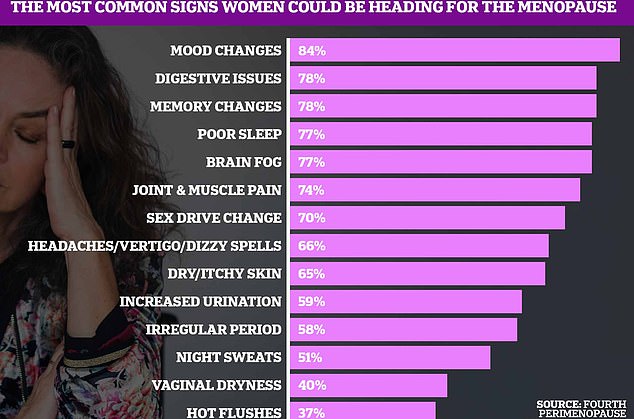A little-known effect of menopause could turn subtle smells into foul odors.
A 45-year-old woman reported recently entering perimenopause, a precursor to menopause that signals the end of a woman’s reproductive years.
She noticed common signs like vaginal dryness and increased sweating, which she could easily remedy with more lubricant during sex and packing on deodorant.
But there’s one symptom she hasn’t found a fix for: her sense of smell ‘is off the charts.’
The anonymous woman explained to an advice column that normally subtle smells like a person’s breath or cheese in a closed fridge have become ‘unbearable.’
And her newfound sense of smell has also ruined her sex life.
She wrote: ‘Worst of all, the smell of bodies has become extremely off-putting. I’m not talking about bad body odor—just regular human smells.’
And despite being in a new relationship, the smell of her partner’s ‘skin, breath and hair turns my stomach.’

An anonymous woman revealed how menopause has caused her sense of smell to become overly sensitive (stock image)

The drop in estrogen and progesterone that causes the menopause has a vast array of effects on the body
Your browser does not support iframes.
Writing to Slate’s advice column, the woman said: ‘If I focus on the sensations in my body, I can sometimes put the smells out of my mind.
‘But other times, I just can’t, and I avoid any physical contact or even sitting too close to them.’
Experts believe perimenopause and menopause can alter a woman’s sense of smell due to a dip in hormone levels, though it’s unclear how common this is.
It’s also unclear how many of the 75million US women undergoing menopause experience changes in smell.
Perimenopause starts around a woman’s mid to late 40s, roughly eight to 10 years before the onset of menopause.
During this time, the ovaries produce less estrogen and progesterone, which are responsible for regulating menstrual cycles and fertility.
Once hormones start to fluctuate, most women in perimenopause and menopause start having irregular or skipped periods, mood changes, low sex drive, vaginal dryness, hot flashes, night sweats and sleep issues.
However, estrogen and progesterone also help maintain the olfactory system, a group of structures including the nose, nasal cavities and olfactory nerve that control sense of smell.
These hormones are thought to help regenerate olfactory sensory neurons and connect them to the olfactory bulb, the brain’s smell processing center.
In some women, menopause may make the olfactory system less sensitive, but in others it could heighten these senses.
The unnamed woman in the advice column wrote: ‘I’ve tried showering with them before sex to see if that helps (it doesn’t) and using scented products on my own skin to see if I can drown out their smell (I can’t).
‘I know it’s me, and they smell perfectly normal.’
The woman also noted she feels self-conscious bringing up the issue to her new partner.
In some cases, menopausal women may experience phantosmia, or smelling odors that aren’t actually there. It makes up about 10 to 20 percent of disorders that affect sense of smell.
Menopausal women with a heightened sense of smell can use air purifiers to help reduce lingering odors and try to use unscented products whenever possible.
Hormone replacement therapy (HRT) has also been shown to alleviate menopause symptoms like hot flashes and night sweats, and anecdotal evidence suggests it could normalize sense of smell.
However, there are no medications or concrete treatments for the side effect.
Share or comment on this article:
A little-known side effect of menopause is ruining my life and doctors don’t know how to help me